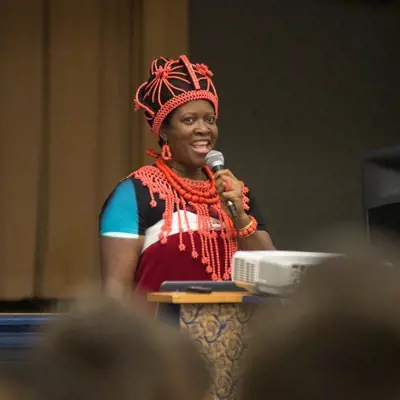
Visiting art professor is visiting royalty on USI campus
Princess Dr. Sweet Ufumwen Akenzua-Ebeigbe shares African culture
December 5, 2014
The University of Southern Indiana Art Department's visiting professor in fall 2014 is a princess with a PhD. Princess Dr. Sweet Ufumwen Akenzua-Ebeigbe, who grew up in the ancient palace of the royal family of Benin City, Nigeria, is teaching USI classes on African art and culture, helped organize an African Cultural Diversity Showcase on campus and has visited elementary and high schools in the Evansville community.
Ebeigbe is one of 58 children of Akenzua II, who was Oba (King) of Benin City from 1933 to 1978. She is the youngest sister of Omo N'Oba Erediauwa, the current Oba of Benin. She inherited a talent for art from her mother, Queen Ehioba Akenzua, who was knowledgeable in beadwork, fabric-making and weaving, and was in charge of the female artisans in the royal harem.
"Africans generally are artists by nature," Ebeigbe said. "And art is such a crucial part of African life that you cannot actually separate art from the African culture; it is entwined with everyday living. If you go to Benin City, where I come from, it is the cradle of art in Africa, and everywhere you go you see art."
The royal palace was the focal point for all the artists and artisans in Benin. The Oba controlled the royal guilds of artisans, including bronze casters, leather workers and wood carvers. He provided food for them and took care of their needs. They, in turn, worked exclusively for the Oba. "I grew up in the midst of art and had the opportunity of interacting with a lot of artists from a very tender age," said Ebeigbe.
The palace was filled with artifacts - bronzes, carved ivory tusks, wood carvings - and the various ceremonies that took place in Benin were occasions for the chiefs and the Oba to display sumptuous and elaborate regalia.
The princess became interested in pottery while visiting an elderly woman potter who lived near the palace. "When other kids were playing, I would sneak into her studio. It was so fascinating to me, and I would pick up little pieces of clay that fell from her table, sit in the corner and produce my pots. I never knew that she was keeping track of what I was doing. One day I sneaked in as usual to pick clay from the floor and she said, 'No, no, no. Don't pick clay from the floor,' and she already had a lump of clay prepared for me and said, 'You can have this to work with.' I've been interested in art ever since, and it wasn't surprising to anybody that I specialized in art."
Ebeigbe is a member of the Society of Nigeria Artists and Craft Potters Association of Nigeria; holds a bachelor's degree in ceramics, master's degree in industrial design and doctorate in art history; and is a lecturer at University of Benin, Benin City, Nigeria.
Her visit to USI is part of a broader effort to bring African culture to USI students. In recent years, Dr. Joseph Uduehi, associate professor of art education, Dr. Michael Ndemanu, assistant professor of teacher education and Dr. Amanuel Beyin, lecturer in Liberal Arts, have partnered with the Provost's Office, Art Department and Rice Library to establish the USI African Cultural Diversity Artifact Loan Program, a collection (in progress) of small and large two- and three-dimensional artifacts that provides the public with hands-on African visual arts resources for educational use.
"You cannot teach African culture just as theory, you have to reach it with the artifacts," said Uduehi, who is also from Nigeria. "That's why we are developing the program with the artifacts and making them accessible. That is how we do it in Africa. We create it because we live it. It is part of our life."
Uduehi has lobbied for a greater emphasis on African culture in the curriculum since he joined the University in 1999. With the support of Provost Ron Rochon, USI recently established a cultural exchange program that allows USI students and faculty to travel to Ghana. Last semester, Uduehi, Ebeigbe and Michael Aakhus, dean of Liberal Arts, presented the second annual USI African Cultural Diversity Showcase, featuring African dance, music, textiles and food. Ebeigbe's initial visit to campus was for the first such showcase in 2013.
Uduehi hopes African Studies will one day be fully available to students, first as an emphasis within the International Studies major and later as its own minor.
Ebeigbe said while in the United States she has encountered a lot of ignorance about Africa. "As an indigene of the African continent, I look at the questions and I cannot understand why some persons are still asking me such questions, but it is not their fault - it's just because they have not been exposed enough to African culture. So at every opportunity I have, I try to give as much knowledge as I can to people, because that is the only way they can learn the truth and the facts about Africa, and that is a way that I can correct some of the misconceptions."
The princess beautifully articulates the importance of cross cultural education. "I believe that the meeting of cultures is one of the catalysts that will bring peace to the world," she said. "When people get to meet and understand one another, they tend to be very tolerant of each other. I don't think the world has exploited that avenue enough in terms of establishing peace in the world."